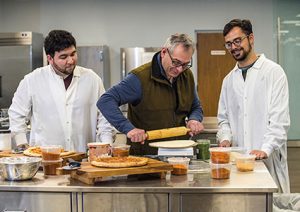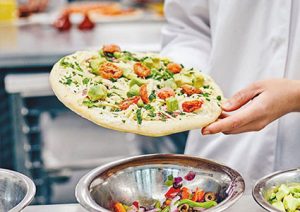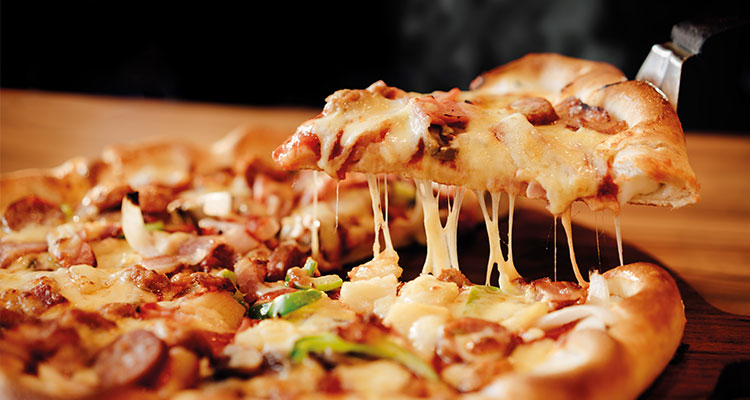Great food from great people: Richelieu Foods’ President bolster the business’ byword
Headquartered in Wheeling, Illinois, Richelieu Foods Incorporated (Richelieu) has been serving North America since 1862. The company’s product range has encompassed a wide variety of different items throughout its lifetime, with condiments and salad dressings its longest-standing offering. Today, the business is one of the largest private-label frozen pizza manufacturers in the US, providing high-quality products to the likes of Walmart, Aldi, Kroger, Albertsons, and Loblaws in Canada. Food Chain sits down with Brian Fox, President and CEO, to learn more about the secrets to Richelieu’s continued rise.

“The organization has been sold a number of times over the years, but since 2018, we’ve been a part of Freiberger, based in Germany, which is owned by Südzucker AG, our overall parent company,” Brian explains. “Today, frozen pizza is our mainstay output, and we are the only producer of our size that only focuses on private label products. We have three plants across the US dedicated to the pizza segment whilst the other one processes our dressings and condiments. We also import some higher-end items from Europe, which we don’t quite have the capacity to make yet, for our client base across the US and Canada. Freiberger has been a leading European producer of Frozen Pizza for many years, and so we are building on that experience here in the US to create great, and innovative products for the US market. One of the key elements that separates us from our competition, is that we are 100 percent private label focused. This means we are not focused on our brands first, and using private label for filling up spare capacity.”
Richelieu’s pizza offerings are separated into three categories: value-oriented, mid-range, and premium. As well as the frozen options, the company produces fresh deli-style pizzas, as Brian details: “The fresh ranges that we manufacture are typically larger styles that appeal to the family. They are packaged in a traditional pizza box to give them that weekend-take-out feel and are designed so that consumers can personalize them with additional toppings. The customizable nature of the fresh range is hugely important; when the customer feels that they’ve been a part of the pizza-making process, it makes the dish that extra bit special. Over the next couple of years we’re looking to branch the pizza segment out further into convenience stores and other food chains that want partially made pizzas as a means to keep costs lower and deliver a consistent product to their customers.
“On our dressings and sauce side, we serve retail outlets in addition to a large food service customer base. We offer both private label and a control label, Bonne Chere, in this segment only. Bonne Chere is oriented around smaller operators that want something unique but don’t have the volume for their own label. Foodservice products are typically sold in gallon-size or larger containers up to five-gallon pails. On the retail side, offerings tend to be more specialized in terms of shape and size by the different categories, but run from 8oz up to 36oz, depending on the customer’s needs. We sell a lot of tartar and cocktail sauce among our less mainstream options, as well as smaller-run adaptations such as spicy versions of traditional dips and dressings, but also provide a number of the traditional basic items like BBQ sauces, Mayonnaise, and a wide variety of salad dressings. We also make industrial products, which are packaged in bulk-sized containers, totes or barrels. These mostly go to meat companies to be used as marinades for pre-cooked meals like ribs or pulled pork.”
Creativity and customization
In 2022, Richelieu invested in a new line to process fresh dough into a frozen base with a rising crust and added new topping capacities to expand capacity significantly. Over the last couple of years, and specifically during the pandemic, the business had been operating at full capacity and looking for ways to get as much out the doors as quickly and efficiently as possible. Supply chain constraints from the pandemic period are now gone, and we are back to growing aggressively and searching for new customers.
“We’ll be starting with flour at one end of the line, and literally palletizing a complete pizza at the other,” Brian says. “We’ve previously purchased our rising crust products from a third party that has been an excellent supplier to Richelieu. They make high-quality products, but we feel like this is a category in which we can create some differentiation, and the added capacity is a huge bonus. Working in the private label sector, innovation is a big part of our day-to-day, and is generally fun and challenging as it comes from two different angles.

“Firstly, we have our excellent internal team that develops new creative items and recipes, but then we also receive requests from our industrial, retail and food service customers with ideas of their own. The private label business is heavily focused on customization and clients will often want to tweak our suggestions, based on their knowledge of the sectors that they serve. They are the ones who truly know their customers and may either want to dial things back to suit a more value-oriented demographic or perhaps upscale them for a more premium-driven product. Either way, it creates an incredibly dynamic environment for product development.
“Not so long ago, our team of five developers partnered with our crust supplier to come up with a focaccia-style base for a pizza. Nobody was really making anything like that, and it tastes great, but we immediately knew that it wasn’t going to sell through every retailer, so it was something that we positioned towards customers that serve a premium demographic. Due to the maturity of its category, we don’t experience the same dynamism when it comes to the condiments side, although the trend toward spicier products has continued to grow. Many people already have a stable base of condiments in their refrigerator and pantry, but we do get to play around with new ideas for things like chicken wing marinades and sauces. Pizza’s just a fun product that people love to be inventive with.”
Richelieu’s focaccia creation was among the new products that the company showcased at the Private Label Manufacturer’s Association show last year. The exhibition offers buyers an opportunity to see the latest exciting product lines from producers across the industry. This is one of the many ways that the business is seeking continual growth across different sectors, by attracting new clients with targeted and innovative products. “We are currently determining which way to expand next,” Brian continues. “In the private label sector, you have to be certain of the avenues you’ve explored before you rush into investments. It’s not something that will necessarily happen next year, it requires a longer scope of planning, but in terms of approaching our clientele with new ideas, we try to do so at least once or twice a year.
Extreme ownership
“Overall, we have a large runway for growth, especially on the pizza side. The private label share of the pizza category in the US is somewhere around 15 percent, but some retail customers are far higher than that. We are still a long way behind the European and UK private label markets, but as the economy has slowed in recent years, our sector’s share has been steadily rising. Historically, the category benefits from consumers opting for the cheaper options, which they continue to purchase after experiencing the high quality of our products. Right now, with the way that inflation has been affecting everybody, providing consumers with great value is important, and through this, our goal is to try and double the size of the business in the next five years. I like to set audacious targets, because they require everyone to think big, and when you think big, you think completely differently.
“During my time at Richelieu, I have tried to create a leadership team that is focused on what I call extreme ownership,” Brian concludes. “We are not afraid to get our hands dirty or support responsibilities that don’t necessarily fall under our normal duties. We are all in this together and willing to help one another wherever we can. We don’t want people with big egos or attitudes, we look for team members who are humble, whilst driven. When it comes to problem-solving, we always focus on the processes, rather than the people, and apply training and new tools to situations, instead of just pointing the finger. The Richelieu culture is a hard one to find, and I am so fortunate to be part of a team that thinks in such a way.”
